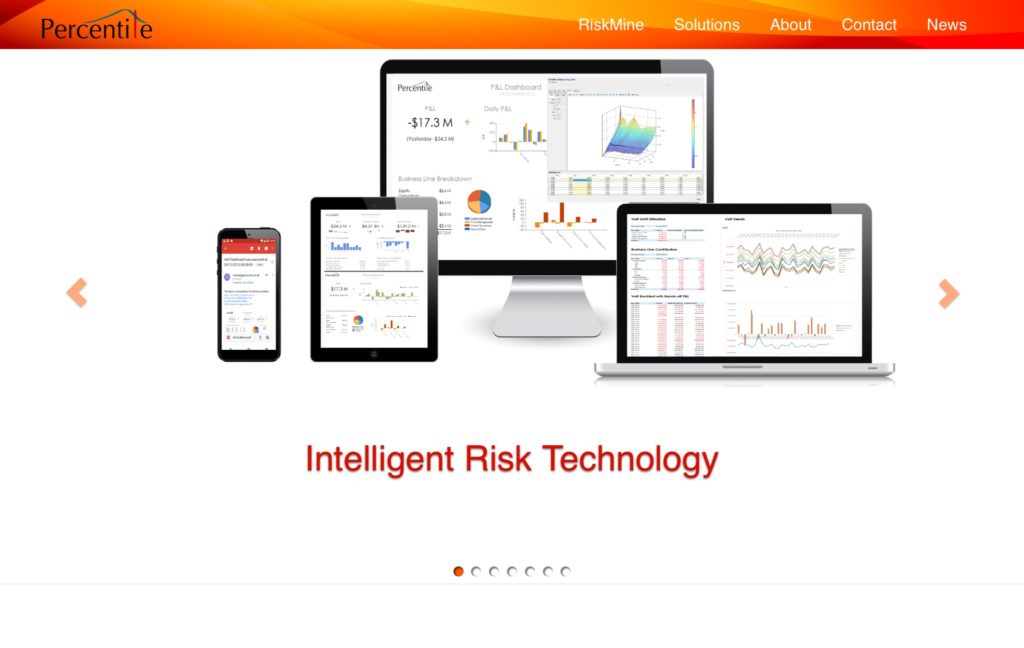Anthony Pereira of Percentile
Today we are joined by Anthony Pereira from Percentile.
Percentile’s RiskMine is an integrated, unified platform for Market, Credit and Counterparty risk.
Our questions are in bold.
– – – – –
Who are you and what’s your background?
We are a team that has worked together for well over a decade, bringing together varied backgrounds before applying ourselves to financial technology. The team brings software engineering experience from large scale data analytics to particle physics simulations, from television and telephony to embedded devices, with a common ideal of producing well engineered software for complex problems. Over the last twelve years we have worked together in capital markets investment banking, successfully delivering high-performance distributed technology for use in front office trading and risk management.

We found ourselves at an innovative, technology driven firm that enabled us to create a unique combination of business knowledge, risk management experience and technology to make complex regulatory compliance into a seamless automated process.
What is your job title and what are your general responsibilities?
My title is CEO. We’re a small team and everyone wears multiple hats. My responsibilities include business development, sales, marketing, fund raising, PR, content writing, business operations, recruitment, and anything else that needs to get done.
One great thing about being in an early stage company is that there is no such thing as a standard day. Generally, I tend to start the day around 6am, catching up on news and information from different sources. I will also use this time to respond to any urgent emails and build my task list for the day. Once I’m in the office, it tends to be pretty much non-stop working with various members of the team on different projects or tasks. Whenever possible, we try to have lunch as a team, so lots of catch-up tends to happen then.
Currently I’m heavily involved in a particular client project which requires me to be on-site often. So juggling that alongside the various aspects of the day-to-day business requirements is an interesting challenge.
The day in the office will normally wind down by 7pm. However, the start-up community in London is now a vibrant scene and I normally attend one or two events during the week.
Can you give us an overview of your business?
Percentile’s RiskMine is an integrated, unified platform for Market, Credit and Counterparty risk. RiskMine manages all the underlying market and static data – ensuring that risk calculations are trustworthy and robust – and all the computations for internal and regulatory requirements. Users can define stress tests and what-if scenarios pertinent to their business.
The results from stress testing and what-if scenarios, as well as relevant risk measures like VaR and ES, are aggregated to give a firm-wide view of risk. These can be accessed via Excel pivot tables or Business Intelligence tools, letting users drill down to position-level figures and slice their data in many different ways, e.g. by counterparty, security type or country.
RiskMine reuses front office models to create a risk pricing engine that is consistent across risk scenarios (VaR, stress etc.), easily reconciled with FO P&L and avoids the need for extra regulatory approval. The modular nature of the platform helps firms focus initially on their most pressing requirements – they can start small and grow.
We service two main sectors of capital markets:
– Regulated Investment Banks
– Mid-to-large Hedge Funds and Asset Managers
Tell us how you are funded
We were bootstrapped for the first 18 months and operationally funded through revenues. Recently we raised a seed round to fund growth in sales, business development and marketing.

Why did you start the company? To solve what problems?
During our time working for an investment bank we observed that most firms struggled with firm-wide risk calculation and monitoring. Something made harder due to the fragmented nature of risk which operates in silos, not just across the front office but across front middle and back office as well. The constantly increasing complexity of risk and regulations requires risk officers to consume a large number of systems for their data. Most of these systems in Capital markets focus on the front office needs, i.e. trading. There is no such thing as a system specifically designed for Risk Officers, working at a granular as well as firm wide level. Until now.
We started Percentile to provide risk officers with the most comprehensive platform for managing all the risks within a firm – with centralised data collection, cleaning, computation and aggregation. In particular, leveraging the risk pricing models in the existing front office systems, rather than introducing yet another reconciliation headache.
With Percentile’s RiskMine platform, firms are able to get a firm wide view of risk across all asset classes and business lines. Their risk officers are able to drive stress testing and complex regulatory calculations with their own inputs and data while staying in sync with front office valuations. All of this without having to build vast amounts of in-house technology that would otherwise be needed.
Who are your target customers? What’s your revenue model?
Percentile works with international investment banks and large hedge funds that have the need for robust risk technology. We license our software on a subscription basis, either on-premises or fully hosted by us.
If you had a magic wand, what one thing would you change in the banking and/or FinTech sector?
Easier and more cost effective access to market data. One of the biggest challenges the industry faces is the rising cost of market data. Data vendors, including the exchanges, are constantly segmenting and monetising data sets making the cost of using this data for risk management extremely expensive. It is also prohibitively expensive for smaller companies to gain access to much of this market data without large financial commitments which in turn makes it difficult to drive innovation.
What is your message for the larger players in the Finance industry?
Look past just in-house development and legacy vendor integration projects. There are niche and specialist companies out there with better solutions to your challenges who will be more aligned to the success of your projects.
What phone are you carrying and why?
I use a Nexus 5, Android phone. At the time it was the best bang-for-buck phone that also gave me the freedom to customise and tweak as I wished. It has mostly held up to my demands on it. Truth be told, I have not really had the time to lust after the latest shiny thing out there.
Where do you get your industry news from?
I mostly use Twitter for my industry news where I follow quite a few sources, so it is difficult to name just one or two. I suppose it is a mixture of Risk.net, GARP Daily News and TABB Group which might make the top few.
Can you list 3 people you rate from the FinTech sector that we should be following on Twitter?
Liz Lumley @LizLum, running StartupBootcamp Fintech and very entertaining
MRodriguezValladares @MRVAssociates, regulatory focused information and news
LondonFintechPodcast @LondonFintech a varied selection of FinTech related podcasts
What’s the best FinTech product or service you’ve seen recently?
How about three?
CheckRecipient – they help make sure confidential emails don’t go to the wrong person. Sounds simple, really hard to accomplish.
Quarule – using advanced language techniques to make sense of regulatory documents and create metrics to stay compliant.
Xignite – easy API access to market data.
Finally, let’s talk predictions. What trends do you think are going to define the next few years in the FinTech sector?
Financial institutions remain extremely nervous about cloud technologies. The smaller firms are already outsourcing and hosting much of their technology needs. In the course of the next couple of years, I see more financial services moving towards cloud based environments as they realise the massive cost benefits and agility that it brings to a firm. The areas most suitable, in my mind, are dev-ops, elastic compute and disaster recovery plans. Primary operations will then follow in due course.
The other shift will be the reduction of in-house development. Banks are seeing increased demand on ROI and development and maintenance of software is fast becoming a luxury. Innovation in this space will continue to provide low cost alternatives to internal systems and manual processes. Reconciliation and various back office operations are already moving in this direction.
This is more of a hope than a prediction. Collaboration is the answer to many of the industry’s problems. We should see more collaboration for industry utilities and between FinTech firms to provide solutions to the challenges before us.
– – – – –
Thanks to Anthony for his answers today. You can find out more about Percentile on their website, Twitter and LinkedIn.
If you would like to receive email updates whenever we publish, sign up to our Newsletter. You can unsubscribe at any time and we will never use your email for anything else.
If you’ve any suggestions for hot FinTech companies (startup, or established ventures) that we should be profiling, or have an opinion piece to offer, or a FinTech related event you’d like to tell us about, have a look here for more details.





